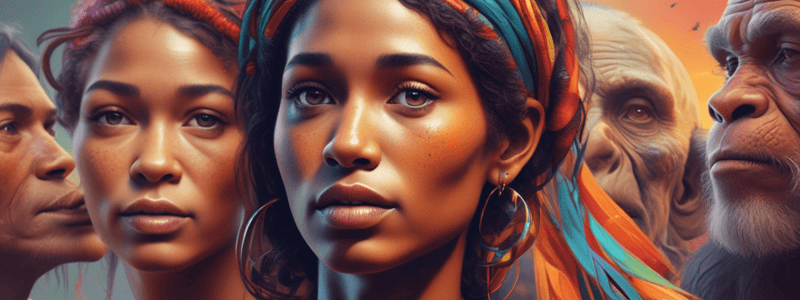Podcast
Questions and Answers
When did Homo sapiens first emerge?
When did Homo sapiens first emerge?
- 200,000 to 250,000 years ago (correct)
- Around 100,000 years ago
- Around 13 to 16,000 years ago
- Around 74,000 years ago
What caused the human population to be reduced to 3,000 to 10,000 people worldwide?
What caused the human population to be reduced to 3,000 to 10,000 people worldwide?
- Migrating out of Africa
- Advancements in hunting and gathering
- A population boom
- A super-eruption at Mount Toba (correct)
Where did humans first migrate to after originating in East Africa?
Where did humans first migrate to after originating in East Africa?
- The Americas
- Australia
- Central Asia and Europe
- The Middle East (correct)
What led to the development of skin color differences in humans?
What led to the development of skin color differences in humans?
What contributed to the rise of scientific racism and fascism in the 20th century?
What contributed to the rise of scientific racism and fascism in the 20th century?
What does the narrative emphasize in navigating the challenges of the 21st century?
What does the narrative emphasize in navigating the challenges of the 21st century?
How does the speaker view diversity in a cultural context?
How does the speaker view diversity in a cultural context?
What is the central idea behind the encouragement to celebrate diversity of thought?
What is the central idea behind the encouragement to celebrate diversity of thought?
How does the text connect the unity of humanity with a concept in the Universe?
How does the text connect the unity of humanity with a concept in the Universe?
What modern consequences are highlighted by the spread of this ideology globally in the 20th century?
What modern consequences are highlighted by the spread of this ideology globally in the 20th century?
Flashcards are hidden until you start studying
Study Notes
- Homo sapiens emerged 200,000 to 250,000 years ago in East Africa with limited genetic diversity, tracing back to a single common ancestor.
- Around 100,000 years ago, humans migrated out of Africa into the Middle East due to a population boom possibly caused by advancements in hunting and gathering.
- A super-eruption at Mount Toba around 74,000 years ago drastically reduced the human population to 3,000 to 10,000 people worldwide.
- Humans spread across South and East Asia, colonized Australia, adapted to colder climates in Central Asia and Europe, and interbred with Neanderthals.
- Humans migrated into the Americas around 13 to 16,000 years ago through the Bering Strait, with genetic tests showing Neanderthal DNA in Eurasian descendants.
- Skin color differences developed over thousands of years as humans moved into regions with varying levels of UV radiation, with depigmentation genes becoming active in areas with less sun.
- The history of war, genocide, and discrimination over human differences can be traced back to evolutionary traits of hostility towards out-groups and tribal markers.- Pseudo-scientists in the 1890s during the rise of European imperialism used unsupported theories, cranial measurements, and biased justifications to divide Europeans into superior and inferior groups, fueling scientific racism in 20th century Europe and contributing to the rise of fascism.
- This ideology spread globally in the 20th century, influencing events like the Sino-Japanese wars, conflicts in Rwanda, Sudan, and others, highlighting the modern consequences of ignoring our common ancestry.
- The narrative emphasizes the importance of recognizing our shared human origins and interconnectedness as we navigate the challenges of the 21st century as a global society, drawing parallels between the unity of humanity and the concept of a single point of origin in the Universe.
- Diversity is celebrated in a cultural context, particularly valuing diversity of thought as essential for human genius and collective learning.
- The speaker concludes by encouraging the celebration of diversity, especially diversity of thought, as a key element in moving forward collectively as a global society.
Studying That Suits You
Use AI to generate personalized quizzes and flashcards to suit your learning preferences.




